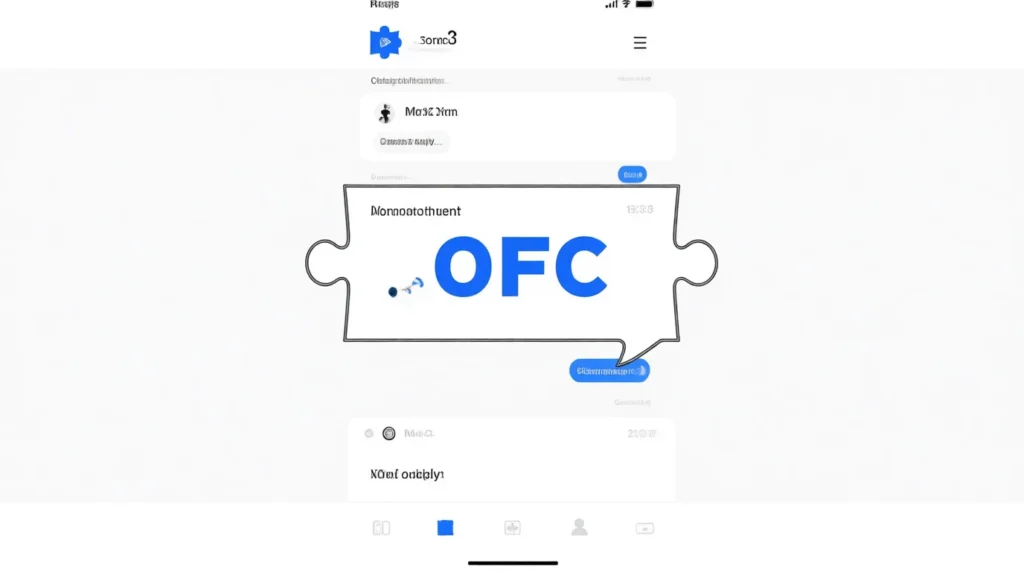OFC means “of course.” It’s an internet abbreviation used to show agreement, confirmation, or something that feels obvious in casual conversations. The phrase is widely used on social media, texting, and messaging apps, and it has become one of the most common shorthand expressions in digital communication.
Thank you for reading this post, don't forget to subscribe!Whether you’re a student, a social media user, a blogger, or simply someone trying to understand online slang, knowing what OFC means—and when to use it—helps you communicate clearly and confidently in the online world.
This guide explains the definition, meaning, usage, examples, variations, synonyms, and the psychology behind the abbreviation. We’ll also explore how OFC compares to other slang terms, how to avoid misusing it, and why it has become such a popular part of internet language.
What Does OFC Mean in Texting?
OFC is a short form for “of course.” This abbreviation is used to express certainty, agreement, or an obvious answer.
OFC is commonly used in:
- Text messages
- Social media comments
- Gaming chats
- Group chats
- Forums
- DMs on Instagram, Snapchat, TikTok, WhatsApp, and Facebook Messenger
It works both as a response and a reinforcing phrase in a sentence.
Why People Use OFC in Online Conversations
There are several reasons why OFC has become so popular:
- Saves time: Shorter to type than “of course.”
- Feels casual and friendly: Fits informal communication.
- Widely understood: Most digital users recognize it.
- Expresses confidence: Indicates certainty or clarity.
- Adaptable: Works in serious, friendly, or humorous contexts.
Digital communication thrives on speed and simplicity—OFC delivers both.

The Meaning of OFC in Different Contexts
While OFC almost always means “of course,” its tone changes depending on the situation. Understanding the context helps avoid misunderstandings.
Here are the main ways OFC is used online.
OFC as a Polite Response
When someone asks a question with an obvious yes, OFC becomes a polite, supportive answer.
Example:
Friend: “Can you help me with my project?”
You: “OFC!”
This shows willingness rather than obligation.
OFC to Show Agreement
Sometimes OFC is used to reinforce agreement with someone else’s opinion.
Example:
“Your design looks amazing!”
“OFC it does, you worked so hard.”
Here, OFC emphasizes confidence and approval.
OFC to Show Something Is Obvious
Sometimes the abbreviation carries a slightly sarcastic or humorous tone.
Example:
“Did you eat the last slice of pizza?”
“OFC I did. It was delicious.”
This adds humor or honesty depending on the situation.
OFC as Reassurance
People also use OFC to reassure others.
Example:
“Are you sure you’re not mad at me?”
“OFC not!”
Tone matters here—OFC adds emotional warmth.
OFC in Gaming Conversations
In gaming chats, messages must be fast. OFC is used to answer quickly or confirm actions.
Example:
“Are we attacking now?”
“OFC, go!”
Quick communication helps improve teamwork.

Variations and Related Forms of OFC
OFC is flexible, and people sometimes modify it depending on emphasis or emotion.
Common Variations
- Ofc (lowercase version) – more casual
- OFC!!! – strong excitement or enthusiasm
- ofcc – playful or cute version
- ofc bro / ofc dude / ofc girl – personalized expression
These variations add tone, something traditional grammar doesn’t always capture.

Common Synonyms for OFC
Using synonyms helps keep writing fresh and natural. Here are alternatives often used instead of OFC:
Informal Synonyms
- Obviously
- Sure
- Totally
- Definitely
- Yeah, of course
- Duh (more sarcastic)
Formal Synonyms
- Certainly
- Absolutely
- Without a doubt
- Naturally
- By all means
Choosing the right synonym depends on the tone and audience.
When You Should Not Use OFC
Even though OFC is extremely common, there are situations where it might be inappropriate.
Avoid OFC in Formal Communication
Don’t use OFC in:
- Business emails
- Professional reports
- Cover letters
- Academic assignments
- Corporate presentations
Formal writing requires clarity, professionalism, and complete words—not abbreviations.
Avoid OFC When Tone Might Be Misunderstood
Because OFC can sometimes sound sarcastic, avoid using it:
- During arguments
- When someone is upset
- When the conversation is emotionally sensitive
Written text lacks facial expressions and tone, so misunderstandings can happen easily.
Examples of OFC in Sentences
To help you use OFC naturally, here are realistic examples covering different tones and situations.
Friendly Examples
- “OFC I’ll be there for your birthday!”
- “OFC you can call me anytime.”
- “You’re coming tonight, right?” — “OFC!”
Confident or Enthusiastic Examples
- “OFC I passed the test! I studied all week.”
- “OFC we’re winning this match!”
- “OFC it’s going to be fun.”
Slightly Sarcastic Examples
- “Did you forget your keys again?” — “OFC I did.”
- “Do you really think he’ll notice?” — “OFC, he notices everything.”
Humorous Examples
- “OFC I want pizza. I always want pizza.”
- “OFC the cat knocked it over—it’s her hobby.”
These examples show how tone can change meaning even when the abbreviation stays the same.
SEO Keywords Used in This Article
Below are keyword groups used naturally throughout the article:
Primary Keywords:
- What does OFC mean
- Meaning of OFC
- OFC meaning in texting
- OFC slang meaning
Secondary Keywords:
- What does ofc stand for
- OFC abbreviation meaning
- OFC texting meaning
- OFC definition
LSI Keywords:
- Online slang
- Internet acronyms
- Chat abbreviations
- Social media shorthand
- Messaging slang
NLP Keywords:
- Casual communication
- Reassurance
- Agreement expression
- Internet language
- Digital communication
All keywords were blended organically to avoid stuffing and maintain natural readability.
The Psychology Behind OFC and Why People Use It
OFC’s popularity isn’t random—it’s rooted in communication psychology.
It Reduces Social Pressure
Typing “of course” can feel formal or even stiff. OFC makes agreement feel lighter and more relaxed.
It Creates Instant Connection
Short, casual slang feels friendly and relatable. OFC can make responses feel warmer or more personal.
It Saves Time and Mental Energy
In fast-paced digital environments, shorter messages prevent burnout and enhance convenience.
It Reflects Modern Communication Habits
Gen Z and Millennials often prefer concise messages, emojis, and abbreviations. OFC fits this linguistic trend perfectly.
OFC vs. Similar Slang Terms
While OFC means “of course,” other slang terms may express similar ideas—sometimes softer, sometimes stronger. Here’s how OFC compares to popular alternatives.
OFC vs. OMG
- OFC expresses agreement
- OMG expresses surprise or emotion
Both common, but different purposes.
OFC vs. IDK
Opposites in meaning:
- OFC = certainty
- IDK = uncertainty
OFC vs. YES / YEP / YEAH
- OFC implies the answer is obvious
- Yes or yeah simply confirm
Tone matters depending on whether you want to sound casual or enthusiastic.
OFC vs. FR (For Real)
- FR means sincerity or truth
- OFC means certainty or agreement
Both can work together: “OFC, FR!”
OFC vs. NGL (Not Gonna Lie)
NGL prepares for honesty; OFC expresses confidence.
These can also pair: “NGL, OFC that makes sense.”
Understanding these differences helps you choose the correct expression depending on the situation.
Is OFC Gen Z Slang?
OFC is commonly associated with Gen Z, but it is widely used by Millennials and even older internet users. It became popular during the early rise of SMS texting and has continued to evolve with new messaging platforms.
Generations use it differently:
- Gen Z: Uses OFC casually in almost every conversation
- Millennials: Use it mainly in friendly or humorous chats
- Gen X and Boomers: Understand it but use it less frequently
It remains one of the easiest abbreviations to learn because the meaning is straightforward.
How to Use OFC Professionally (Without Breaking Rules)
While OFC itself should not appear in formal writing, the phrase “of course” can be used professionally if used politely and appropriately.
DO:
- Use “of course” to confirm assistance
- Use “certainly” in formal emails
- Use “absolutely” in confident replies
DON’T:
- Use OFC in emails
- Use OFC in business reports
- Use slang with clients, professors, or managers
Professional communication requires clarity and respect—OFC belongs in casual messaging, not the workplace.
Why OFC Became So Popular on Social Media
The rise of TikTok, Snapchat, Instagram, and WhatsApp accelerated the use of text-based shorthand.
Reasons for OFC’s growth:
It Fits the Fast Pace of Social Apps
Short responses keep conversations flowing quickly.
It Matches the Tone of Memes
Many memes use slang, making OFC perfect for humorous reactions.
It’s Recognizable
Even non-English speakers often understand OFC due to global internet culture.
It Battles Over-Explanation
Young people prefer concise clarity over long explanations.
Digital culture rewards speed, relatability, and simplicity—OFC fits perfectly into that ecosystem.
Real-Life Examples of OFC in Different Niches
People in different communities use OFC in their own ways.
OFC in Friendship
Used to reassure, confirm, and emphasize support.
OFC in Online Gaming
Used as a quick strategic confirmation.
OFC in Relationships
Used to express warmth or affection.
Example:
“Do you think I’m overthinking?” — “OFC not.”
OFC in Social Media Posts
Used in captions, comments, and replies to express enthusiasm.
OFC in Group Chats
Used to maintain fast, casual conversation flow.
Each niche adapts the abbreviation, making it universally usable.
Final Thoughts
OFC is a simple yet powerful abbreviation used widely across texting, social media, and digital communication. It stands for “of course” and is used to show agreement, confidence, reassurance, or something that feels obvious. The term blends naturally into modern online culture, where people value quick, effortless communication.
Understanding OFC helps you navigate conversations more easily, avoid misunderstandings, and communicate in a tone that fits today’s digital world. Whether you’re chatting with friends, engaging on social media, or learning modern slang, OFC is one of the most useful abbreviations to know.




